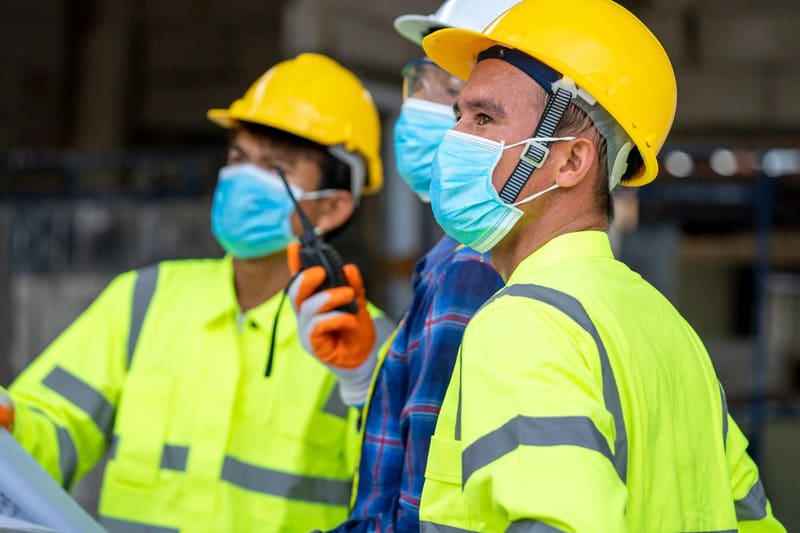Navigating the Complexities of Construction Insurance
The construction industry is complex and dynamic, and in order to capitalize on available opportunities, it’s crucial for businesses to implement strategies that promote employee safety, safeguard assets, and help provide protection from potential delays. Whether you’re a project owner, architect, engineer, or contractor, having the right insurance solutions for your needs can help you protect your assets and keep you competitive.
So, where should you start? Though each project and business has distinct insurance needs, there are fundamental coverages that you’ll want to consider. You’ll also want to be sure you read the fine print of your policies, since no two policies are the same, and coverage terms may change from year to year. As you weigh your options, our advisors with dedicated construction insurance expertise can help you navigate the world of insurance, helping you achieve a strategy that’s aligned with your goals.
Why Construction Insurance Matters
Construction insurance acts as a vital safety net that helps protect owners, contractors, subcontractors, developers, tradesmen, engineers, and architects against unanticipated events that may emerge during a project. Having the right insurance can prove to be critical in situations when you have to pay for an employee to receive care for work related injuries, if your equipment is damaged or stolen, or if you’re dealing with delays brought on by natural catastrophes. Having a financial safety net through insurance can help you rebound from losses, so you could complete your projects on time and on budget, bolster your reputation and credibility in the industry, and achieve longevity.
The Benefits of a Comprehensive Strategy
Building a customized, comprehensive construction insurance strategy offers numerous benefits, including:
- Financial protection: Protect your business from significant financial losses due to accidents, property damage, or legal claims. This can include coverage for equipment damage, theft, and worksite injuries, which may otherwise lead to financial losses.
- Legal compliance: Construction projects often require adherence to a myriad of laws and regulations. Certain coverages may be legally required, so you’ll want to be sure you remain compliant with state and federal regulations to avoid fines and lawsuits.
- Reputation and credibility: Having the right insurance can signal your professionalism and reliability, and instill confidence in clients and partners. Clients may be more likely to engage with contractors who have comprehensive insurance or might even require it before engaging in business, as it assures them that their projects are better protected against potential risks.
6 Different Types of Construction Insurance
General Liability Insurance
General liability insurance is one of the most important coverages of a construction insurance strategy. This policy typically covers third-party claims of bodily injury and property damage, helping protect your business from a wide range of scenarios that could result in significant financial loss. For instance, if a passerby is injured by falling debris from your construction site, general liability insurance could help cover the medical costs and legal fees that might arise. This type of insurance can also cover situations when nearby properties are damaged by construction activities.
Workers’ Compensation Insurance
Most states require that businesses purchase workers’ compensation insurance, which covers medical costs and lost income for workers injured on the job. Workers’ compensation can provide financial relief that protects your bottom line and your employees’ wellbeing. This insurance is especially essential for the construction industry, since it helps businesses cover the employees’ medical costs for on-the-job injuries, which can quickly add up. The National Safety Council reports that the average cost of a workplace injury claim in 2022 was $40,000. Having workers’ compensation coverage helps contribute to a culture of safety that can boost employee morale.
Builders’ Risk Insurance
This is a specific type of property insurance created to protect buildings and structures while they are still being built. It can cover losses triggered by fire damage, vandalism, and bad weather, in addition to many other exposures. This type of insurance usually covers materials, supplies, fixtures, and machinery that are intended to become a permanent part of the building or structure. Builder’s risk insurance is crucial for projects of all sizes, from residential home construction to large-scale commercial builds. It helps ensure your investments are safeguarded during the construction period so that you’re better able to respond to incidents that could otherwise have significant financial repercussions or cause major delays in the project. Builder’s risk insurance can be highly customized from project to project and tailored to address very specific areas of risk, such as theft, personnel mistakes, or even soft charges, like increased interest on loans and legal bills.
Professional Liability Insurance
Professional liability insurance, also known as errors and omissions insurance, helps protect against claims of negligence, errors, or omissions in the services provided. This type of insurance is especially crucial for professionals, such as consultants, architects, and engineers. If a client claims that your designs, advice, or services caused them financial loss, this insurance can help you cover legal costs, like defense fees, and any settlements or judgments made against you.
Environmental / Pollution Insurance
Environmental (or Pollution) Insurance protects against injuries and damages that arise from hazardous materials, such as asbestos, lead, mold, fungus, and other contaminants. It fills a critical gap in most general liability policies and projects property owners and provides valuable protection against unexpected pollution conditions that materialize during or resulting from construction operations.
Commercial Auto Insurance
In the event of an accident, theft, or damage, a commercial auto insurance policy usually covers owned, leased, hired, or owned company vehicles, such as trucks and vans that transport supplies, equipment, or even passengers. A commercial auto policy also provides liability coverage, which helps protect your company from costly litigation that may arise from accidents involving your commercial vehicles. Whether you operate a small business with a few delivery vans or are a major corporation with a fleet of trucks, consider the benefits that a commercial auto insurance policy can provide, especially in the context of litigation trends.
Equipment Insurance
Equipment insurance covers tools and equipment utilized at the job location. This coverage can provide funds so that you’re able to replace or repair damaged, lost, or stolen equipment, ranging from big machinery like excavators and cranes, to smaller instruments like drills and saws. By reducing downtime, you can keep your projects running smoothly and on time. This type of insurance may also cover equipment in transit or stored in different locations, helping you achieve comprehensive protection for your valuable assets wherever you use them.
Umbrella Insurance
Umbrella insurance helps you expand the layers of protection you get from other liability coverages, such as general liability and commercial auto insurance. This additional layer of protection typically kicks in when you’ve maxed out your limits on your other policies rather than paying for these excess losses out of your company’s coffers. Umbrella insurance is a safety net that helps cover expenses, such as legal fees, medical bills, and damages when they exceed the limitations of your primary insurance. Because of the risks inherent to the construction industry, umbrella insurance is one of the best investments to consider as a way to help financially protect your business from catastrophic loss.
Surety Bonds
Surety bonds, also known as construction bonds, are not insurance policies but are often required in the construction industry to help manage the risks associated when working with multiple parties in the course of a project. They act as a financial guarantee that you will complete a project as agreed. There are different types of surety bonds, including bid bonds, performance bonds, and payment bonds, each serving a specific purpose to help ensure project completion and financial responsibility. Bid bonds assure that the contractor will honor their bid and take on the project if selected. Performance bonds guarantee that the contractor will perform the work as outlined in the contract. Payment bonds ensure that subcontractors and suppliers are paid for their work and materials. Together, these bonds form a critical safety net that fosters a greater sense of mutual trust and reliability in the construction industry.
How to Choose the Right Insurance
From selecting coverages, deductibles, and premiums, building your construction insurance strategy requires careful consideration. To help ensure that you are adequately protected, here are some steps you can take to make an informed decision:
- Assess your risks: Start by identifying the specific risks associated with your projects and day-to-day operations. This could include potential liabilities, like property damage, employee injuries, or environmental hazards. Understanding these risks will help you determine which policies are essential for your business.
- Consult a construction insurance advisor: Partnering with an insurance advisor who has experience in both the industry and construction insurance can help you simplify the complexity of insurance while helping you obtain complete coverage at a competitive price. A Baldwin Group advisor can provide you with personalized recommendations based on your unique needs and help you navigate the intricacies of different insurance products. We can also help you identify any gaps in your current coverage.
- Compare quotes: Obtain quotes from multiple insurance providers to help ensure you’re getting the best coverage at a competitive price. Don’t just look at the premiums; consider the scope of coverage and the reputation of the insurers. Taking the time to compare can result in significant cost savings and better protection.
For more information
We’re ready to help when you are. Get in touch and one of our experienced Baldwin advisors will reach out to have a conversation about your business or individual needs and goals, then make a plan to map your path to the possible.
This document is intended for general information purposes only and should not be construed as advice or opinions on any specific facts or circumstances. The content of this document is made available on an “as is” basis, without warranty of any kind. The Baldwin Insurance Group Holdings, LLC (“The Baldwin Group”), its affiliates, and subsidiaries do not guarantee that this information is, or can be relied on for, compliance with any law or regulation, assurance against preventable losses, or freedom from legal liability. This publication is not intended to be legal, underwriting, or any other type of professional advice. The Baldwin Group does not guarantee any particular outcome and makes no commitment to update any information herein or remove any items that are no longer accurate or complete. Furthermore, The Baldwin Group does not assume any liability to any person or organization for loss or damage caused by or resulting from any reliance placed on that content. Persons requiring advice should always consult an independent adviser.






